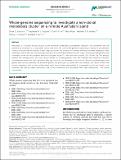Files in this item
Whole-genome sequencing to investigate a non-clonal melioidosis cluster on a remote Australian island
Item metadata
| dc.contributor.author | Sarovich, Derek S | |
| dc.contributor.author | Chapple, Stephanie N J | |
| dc.contributor.author | Price, Erin P | |
| dc.contributor.author | Mayo, Mark | |
| dc.contributor.author | Holden, Matthew T. G. | |
| dc.contributor.author | Peacock, Sharon J | |
| dc.contributor.author | Currie, Bart J | |
| dc.date.accessioned | 2017-11-13T17:30:08Z | |
| dc.date.available | 2017-11-13T17:30:08Z | |
| dc.date.issued | 2017-08-31 | |
| dc.identifier | 251486201 | |
| dc.identifier | 9c44400a-2a62-4134-8294-6365f8595d3a | |
| dc.identifier | 29026657 | |
| dc.identifier | 85048564512 | |
| dc.identifier | 000431155400002 | |
| dc.identifier.citation | Sarovich , D S , Chapple , S N J , Price , E P , Mayo , M , Holden , M T G , Peacock , S J & Currie , B J 2017 , ' Whole-genome sequencing to investigate a non-clonal melioidosis cluster on a remote Australian island ' , Microbial Genomics , vol. 3 , no. 8 , e000117 . https://doi.org/10.1099/mgen.0.000117 | en |
| dc.identifier.issn | 2057-5858 | |
| dc.identifier.other | PubMedCentral: PMC5610713 | |
| dc.identifier.other | ORCID: /0000-0002-4958-2166/work/60196506 | |
| dc.identifier.uri | https://hdl.handle.net/10023/12075 | |
| dc.description | This study was funded by National Health and Medical Research Council (Australia) grants 1046812 and 1098337. E. P. P. is in receipt of a University of the Sunshine Coast Research Fellowship. | en |
| dc.description.abstract | Melioidosis is a tropical disease caused by the bacterium Burkholderia pseudomallei. Outbreaks are uncommon and can generally be attributed to a single point source and strain. We used whole-genome sequencing to analyse B. pseudomallei isolates collected from an historical 2-year long case cluster that occurred in a remote northern Australian indigenous island community, where infections were previously linked to a contaminated communal water supply. We analysed the genome-wide relatedness of the two most common multilocus sequence types (STs) involved in the outbreak, STs 125 and 126. This analysis showed that although these STs were closely related on a whole-genome level, they demonstrated evidence of multiple recombination events that were unlikely to have occurred over the timeframe of the outbreak. Based on epidemiological and genetic data, we also identified two additional patients not previously associated with this outbreak. Our results confirm the previous hypothesis that a single unchlorinated water source harbouring multiple B. pseudomallei strains was linked to the outbreak, and that increased melioidosis risk in this community was associated with Piper methysticum root (kava) consumption. | |
| dc.format.extent | 7 | |
| dc.format.extent | 235934 | |
| dc.language.iso | eng | |
| dc.relation.ispartof | Microbial Genomics | en |
| dc.subject | Melioidosis | en |
| dc.subject | Source tracing | en |
| dc.subject | Burkholderia pseudomallei | en |
| dc.subject | Recombination | en |
| dc.subject | Population genetics | en |
| dc.subject | Outbreak | en |
| dc.subject | RA0421 Public health. Hygiene. Preventive Medicine | en |
| dc.subject | DAS | en |
| dc.subject | SDG 3 - Good Health and Well-being | en |
| dc.subject.lcc | RA0421 | en |
| dc.title | Whole-genome sequencing to investigate a non-clonal melioidosis cluster on a remote Australian island | en |
| dc.type | Journal article | en |
| dc.contributor.institution | University of St Andrews. School of Medicine | en |
| dc.contributor.institution | University of St Andrews. Infection Group | en |
| dc.contributor.institution | University of St Andrews. Infection and Global Health Division | en |
| dc.contributor.institution | University of St Andrews. Biomedical Sciences Research Complex | en |
| dc.identifier.doi | https://doi.org/10.1099/mgen.0.000117 | |
| dc.description.status | Peer reviewed | en |
This item appears in the following Collection(s)
Items in the St Andrews Research Repository are protected by copyright, with all rights reserved, unless otherwise indicated.

